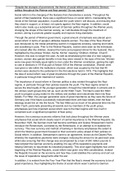“Despite the changes of government, the theme of social reform was central to German
politics throughout the Weimar and Nazi periods” Do you agree?
Social reform is the changing of the features that characterise a society. Throughout the
period of Nazi leadership, there was a significant focus on social reform, manipulating the
minds of the German population, in particular the youth which I will discuss, and ensuring that
they stood in support, or at least, not openly against, the Nazi regime. In addition, social
reform also made up a substantial amount of German politics throughout the Weimar years,
changing the shape of the German society, as I will illustrate through the treatment of
women, aiming to promote greater equality and improve living standards.
Through the period of Weimar government, a great amount of emphasis was placed upon
social reform in terms of people’s attitudes towards women. The idea of the ‘New Woman’
was introduced by the media presenting women in magazines smoking, wearing short skirts
and socialising in pubs. Prior to the Weimar Republic, women were seen as the individuals
who looked after the children, cleaned the home and prepared dinner for the husband; this is
highlighted by the phrase “Kinder, Küche, Kirche” meaning “Children, Kitchen, Church”.
However, this was no longer the case. As well as emphasising the idea of a new outgoing
women, women also gained benefits in how they were viewed in the eyes of the law. Women
were now given formally equal rights to men under the Weimar constitution, gaining the right
to vote in elections in 1919 as part of Article 109 of the Weimar constitution. Women were
now given a role within the institutions of power, which was coupled by the fact that 49
women were elected to the parliament in the first elections held in 1919. This highlights that
the idea of social reform was of great importance through the years of the Weimar Republic,
in particular through their treatment of women.
The importance of social reform in German politics is also evident throughout the Nazi
regime, in particular through their policies towards the youth. The Nazi regime aimed to
secure the total loyalty of the younger generation, through the indoctrination in schools and in
the various youth groups they set up, such as the Hitler Youth. The Nazi’s used the Hitler
youth to prepare young males for the military and warfare and indoctrinate them into Nazi
beliefs. For Hitler, the younger generation were of great importance as they were the future of
Germany and if the Nazis successfully indoctrinated them with Nazi beliefs, then the Nazi
ideology would live on into the future. The fact Hitler put so much of his personal time into the
Hitler Youth, personally presenting all awards won by members of the youth group,
emphasises just how important social reform was to the Nazi regime and how much it
comprised such a significant proportion of Nazi policy.
However, the numerous economic reforms that took place throughout the Weimar years
emphasise that social reform clearly wasn’t of central importance to the Weimar Republic. By
November 1923, the German mark had become worthless and Gustav Stressemann had to
introduce the Rentenmark, controlled by the Rentenbank, in an attempt to re-stabilise the
currency. This new currency and method of banking in Germany emphasises the extent to
which the Weimar government focused on their economic policy ahead of their policies on
Social reform. In addition, Stressemann came to an agreement, known as the Dawes Plan,
whereby the reparations payments were changed, reducing the amount to be paid each year,
whilst also ensuring that this change was accompanied by a loan of £40 million pounds to
help kickstart the German economy enabling it to pay off its reparations payments and
helping Germany to rejuvenate its industrial prosperity. This once again highlights how at the
beginning of the Weimar Republic, social reform was given very little consideration, instead
the Republic focused on the economy and how they could stabilise the currency and sort out
the issue of reparations repayments after the war.
In addition, it is evident from the Four Year Plan that the Nazi’s viewed the economy to be of
great importance, thus highlighting the theme of social reform wasn’t central to German





